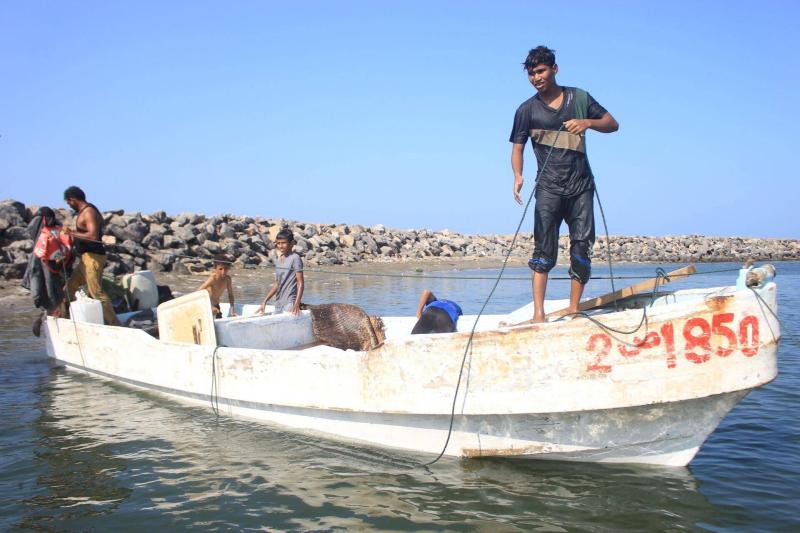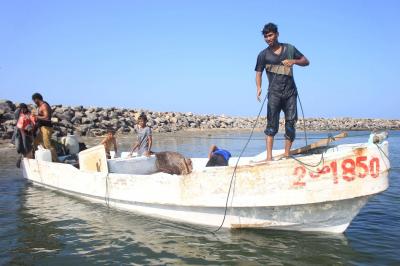The military escalation taking place in the maritime corridor of the Red Sea has intensified the suffering of Yemeni fishermen, who rely on the sea as their primary source of livelihood. Today, they look to the future with anxiety amid the lack of solutions in sight to end the exchange of missile fire between the Houthi group and American and British forces.
The Undersecretary of the Yemeni Ministry of Fishery Wealth for Fish Production and Marketing in Aden, Ghazi Lahmar, stated, "The escalation of events in the Red Sea has worsened the situation for fishing activities in Yemen and the fishing sector in general, placing further burdens on fishermen who are already suffering from the decline in their work as fishing ports and boats have been damaged due to the civil war that has torn the country apart for nine years." Lahmar told Reuters, "The fishing sector has sustained significant damage and near-total destruction of infrastructure due to the war, with the situation worsening since tensions erupted in the Red Sea, increasing fears for the lives of fishermen and putting them in danger."
The Houthi group in Yemen, allied with Iran, has been launching missile and drone attacks on ships and tankers associated with Israel, Britain, or the United States in the Red Sea since mid-November, in solidarity with the Palestinians in the Gaza Strip, which is experiencing the worst humanitarian crisis that has led to nearly the entire population fleeing their homes due to a massive Israeli air and ground assault. The United States and Britain have responded with precise airstrikes on Houthi targets since mid-January, aiming to restore stability to the maritime corridor that many international shipping companies have diverted from, redirecting their vessels to longer and more expensive routes around the African continent.
Thousands of fishermen are now operating cautiously near the Yemeni coasts due to the presence of Western warships and military vessels in the Red Sea, which has impacted fishing areas in the northwestern Yemeni governorates such as Al Hudaydah, Hajjah, and the areas of Al Khawkhah, Al Mokha, Dhubab, and Bab-el-Mandeb.
Fish export revenues are an important source of foreign currency for Yemen, and the fishing sector is vital for the country's economy, ranking second in GDP after oil. Official estimates indicate that "Yemen's annual fish production was around 200,000 tons before the outbreak of the civil war in early 2015. Between 40 to 50 percent of this production was exported, generating revenues estimated at around 300 million dollars. However, since the war started, production volume has halved due to the displacement of fishermen and workers in the fishing sector."
Internationally recognized Yemeni authorities stated they are "recently coordinating through the Ministry of Fishery Wealth with Coast Guard forces to establish a joint operations room and set up a working mechanism to ensure the safety of fishermen in the Red Sea and Gulf of Aden, organizing the entry and exit of fishermen during their trips and tracking their movements between coastal governorates to protect them and maintain maritime safety and security."
Yemen has a coastline of over 2,000 kilometers along the Red Sea, Arabian Sea, and Gulf of Aden, rich in fish and marine resources.
### Fear and Panic
In an interview with Reuters, the head of the fishermen's association in Al Khawkhah, Khaled Al Zarnouqi, mentioned, "Thousands of fishermen in Al Khawkhah have stopped fishing activities due to fear of the foreign forces present in the sea." He added that "fishermen's fears increased after eight fishermen from Al Khawkhah, which is under the control of the internationally recognized government in the west of the country, were found with bullet wounds on their bodies after a week of losing contact with them, just days after the American navy sank three Houthi boats."
He emphasized that the recent military escalation has had a significant impact on the conditions of fishermen and their families, especially since most Al Khawkhah residents rely on fishing to feed their hungry families. The population of Al Khawkhah, located 163 kilometers south of the city of Al Hudaydah, is approximately 200,000, making it one of the coastal areas most affected by the ongoing tensions in the Red Sea, albeit to a lesser degree than the neighboring cities of Al Mokha and Midi.
Saeed Ali Al Tehami, a 48-year-old fisherman in Al Khawkhah, told Reuters, "I risk my life to fish, which I rely on to feed my family," amidst severe winds and rough waves. However, with the military escalation and the presence of warships, he chose not to risk his life, along with many of his colleagues. He added, "We are suffering from hunger and need. We want this unprecedented escalation in the sea to stop so we can return to fishing, our only source of livelihood. Today, fishermen can barely secure a day's sustenance to feed their families, moving quickly along the coast instead of venturing into deeper waters for limited periods to catch small amounts of fish before returning home due to fears of missiles."
However, the situation seems slightly better along the coasts facing the Gulf of Aden. Fisherman Rashid Azar, 45, in the Faqm area west of Aden, told Reuters that the dangers faced by fishermen in the Gulf of Aden are 50 percent less compared to those in the Red Sea. He noted, "We no longer risk taking boats out to sea to venture into deeper waters in the Red Sea as we used to for specific types of fish, as we might return to the beach from whence we came, or missiles could claim our lives."
Tuna fish represent a key type that many medium- and low-income families rely on as a main meal due to its lower price. Azar mentioned that "most fishermen used satellite-connected Thuraya phones, but currently everyone has stopped using them due to the western warships intercepting communications and sometimes chasing and targeting fishermen."
The Houthis blame the Western airstrikes for the deteriorating conditions. Aziz Atini, director of ports and fish centers in the Red Sea area in Al Hudaydah under Houthi control, told Reuters that the international coalition led by the United States and Britain is responsible for the dangers faced by fishermen due to the warships and military vessels that have continued to arrive in the region under the pretext of protecting international shipping.
Atini pointed out that "commercial ships and tankers receive daily threats from the American and British navies warning them against traversing the Red Sea."
Al Hudaydah is one of the vital cities in Yemen, housing three ports: Al Hudaydah, Salif, and Ras Isa, located on the shores of the Red Sea. It is situated near the historic port of Al Mokha on Yemen's western coast and is close to international shipping lanes, making it the second-largest governorate by population. The Houthi movement controls densely populated northern areas of Yemen nearly nine years into the war against a Saudi-led coalition supported by the United States.




